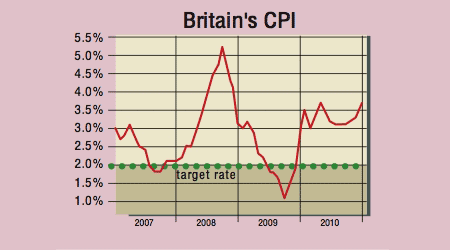
Yet again, the latest inflation figures are “horrible”, said Howard Archer of Global Insight. The annual rate of consumer price inflation (CPI) jumped to an eight-month high of 3.7% in December. Analysts had expected 3.4%. Food and fuel prices were the chief culprits. But core inflation, which strips out these volatile components, rose too. It is now at 2.9%, almost a 13-year high. Inflation has spent 41 of the past 50 months above the Bank of England’s 2% target. Sterling bounced to a two-month high of almost $1.60 as markets pencilled in an increase in interest rates of 0.25% by the end of June.
What the commentators said
The core inflation figure shows that Britain has “an endemic inflation problem”, said Lex in the FT. Price rises can’t be blamed on temporary factors, such as commodity prices or tax changes, although these will ensure that the headline figure goes even higher in the short term. January’s VAT rise will come through in next month’s figures. Michael Saunders of Citigroup reckoned CPI will hit 5% in September. The Bank of England, which keeps insisting that inflation will eventually fall back, is facing a “crisis of credibility” and thus needs to raise interest rates, he said.
The trouble is that the economy is still in “a delicate state”, said The Times. House prices are falling, consumer debt is still high and bank lending is weak. “There is a real risk that higher interest rates could choke off the recovery.” Even a small rise could trigger repossessions and bankruptcies. Moreover, the key danger when it comes to inflation is a wage-price spiral, and there is no sign of that. With the fiscal squeeze setting in, cuts are likely to dampen wage demands.
But it may not be too long before a wage-price spiral sets in, despite the lacklustre economy. As Ian King points out in the same paper, high inflation is already putting upward pressure on pay packets as workers try to offset their loss of purchasing power. BAA, BT, Corus and Heinz are four examples of firms where workers have successfully struck for higher pay. Hay Group expects the median private-sector pay rise to be 3% this year.
In the meantime, said Damian Reece in The Daily Telegraph, keeping the key interest rate on hold could actually result in higher overall interest rates for borrowers. That’s because the markets are beginning to question whether the Bank is really committed to fighting inflation. If investors decide that it’s more interested in “reinflating the economy at all costs” than keeping a lid on price rises, gilt yields – long-term interest rates – will rise, negating the stimulus from a stable base rate. It would be best for the Bank to raise the base rate a little now to show it’s serious, rather than have to rush to do so by a greater amount later. Add it all up and the Bank faces “an acute dilemma”, said King. And while it ponders what to do, added Alan Clarke of BNP Paribas, we remain mired in “stagflation-lite”.